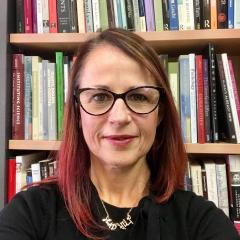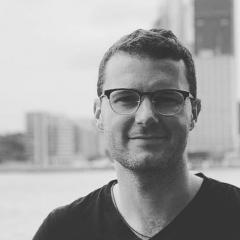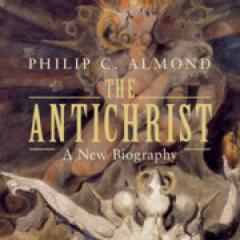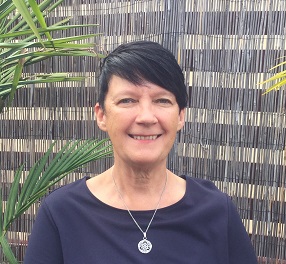 Debra Parish is currently undertaking PhD studies in the School of Historical and Philosophical Inquiry and hopes to finish around the middle of 2021. Her advisors are IASH's Emeritus Professor Phil Almond and Dr Jennifer Clement from the School of Communication and Arts.
Debra Parish is currently undertaking PhD studies in the School of Historical and Philosophical Inquiry and hopes to finish around the middle of 2021. Her advisors are IASH's Emeritus Professor Phil Almond and Dr Jennifer Clement from the School of Communication and Arts.
What are you working on at the moment?
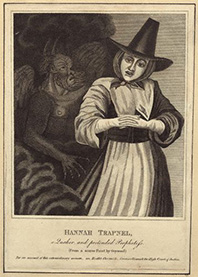 At the present time I am working towards completing my PhD thesis. I am in my final year and busy with making all those necessary revisions to several draft chapters. My thesis topic is Anna Trapnel: Prophet or Witch? Witchcraft Discourse in England 1640-1660. My research focuses on the seventeenth-century prophetess, Anna Trapnel, who gained notoriety for her prophetic performances but was also labelled a witch by her religious and political enemies. Trapnel, unmarried and financially independent, journeyed from London to Cornwall to expand her prophetic activity. There, she was arrested on charges of ‘vagrancy’ and ‘stirring up rebellion’. At her trial she was accused of witchcraft and, as Trapnel tells us, she ‘narrowly avoided the witch-tryer woman and her great pin’. My thesis looks at Trapnel’s shifting identity from revered prophet to dangerous witch, exploring how the prophet and witch categories were defined and manipulated within the political and religious debates of the English Civil War period.
At the present time I am working towards completing my PhD thesis. I am in my final year and busy with making all those necessary revisions to several draft chapters. My thesis topic is Anna Trapnel: Prophet or Witch? Witchcraft Discourse in England 1640-1660. My research focuses on the seventeenth-century prophetess, Anna Trapnel, who gained notoriety for her prophetic performances but was also labelled a witch by her religious and political enemies. Trapnel, unmarried and financially independent, journeyed from London to Cornwall to expand her prophetic activity. There, she was arrested on charges of ‘vagrancy’ and ‘stirring up rebellion’. At her trial she was accused of witchcraft and, as Trapnel tells us, she ‘narrowly avoided the witch-tryer woman and her great pin’. My thesis looks at Trapnel’s shifting identity from revered prophet to dangerous witch, exploring how the prophet and witch categories were defined and manipulated within the political and religious debates of the English Civil War period.
I am also working on some articles for publication, drawn from my PhD research and earlier MA research from the same early modern period. I have recently had a book chapter on Anna Trapnel published by the University of Amsterdam Press in a collection titled, Women on the Edge in Early Modern Europe. I am also currently working on a journal article based upon a paper I presented in 2019 at a conference at Oriel College, Oxford University. The article looks at the ideas of ‘civility’ and ‘female modesty’ as constructs used to wield power in political and religious discourse.
What social benefit do you see in this research?
My research of women in the early modern period, contributes to raising the visibility of these women who have been until quite recently, hidden from history. My study reveals that hundreds of women exercised considerable religious authority as prophetesses during the English Civil War period. I also throw light on how witchcraft accusations were often tied to issues of religious power. My study of these women’s experience and persecution, also ties in with current opposition in some circles, to women joining church ministries. Indeed the same Pauline biblical text, “Let your women keep silence in the churches, for it is not permitted unto them to speak” (1. Cor.14: 34), used to deny women’s spiritual voice in this past context, is also cited widely today in arguments against women exercising authority in the church. The label of ‘witch’ is still implemented in contemporary political discourse, and often women in power are accused of being witches by their opponents. My research aims to reveal that witchcraft language and accusation is often tied to wider issues of power.
Who/what have been the greatest influences on your own work?
I have been interested in historical research, and women’s experiences in seventeenth-century England since my undergraduate study at La Trobe University, Melbourne. Back then it was a large and vibrant history faculty. My interest in this period was inspired by the teaching of two lecturers, Dr. Lotte Mulligan and Judith Richards who designed and led a course on seventeenth-century England and the History of Ideas. I became increasingly interested in the radical religious and social ideas of the English Civil War period and was fortunate to attend a Christopher Hill symposium on at the ANU during my Honours year. After completing my Honours thesis on religious sectarianism and the ‘Ranters’, I decided with my MA research to focus on the lesser studied area of women’s religiosity and prophecy in these same turbulent times. These earlier influences led to my current research interests in women’s religious authority and witchcraft.
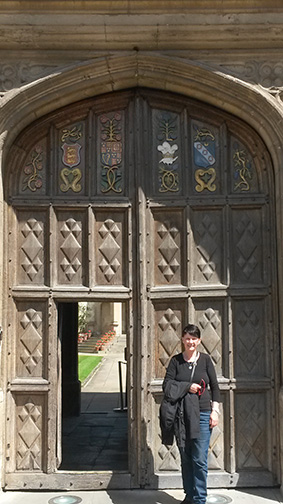 How do you like to unwind when you’re not working?
How do you like to unwind when you’re not working?
When I’m not shut away at my desk doing my research and writing, my other great interest is travel. The study of Trapnel and other seventeenth-century English women accused of witchcraft, has taken me on quite a journey. I have enjoyed research and conference trips to the UK and have visited several of the major witchcraft sites in England, most notably Pendle Hill. I have been led to the Bodleian library which houses Trapnel’s last prophetic text; a 1000 page tome written almost entirely in verse! Following in Trapnel’s footsteps I also stumbled across the Museum of Witchcraft and Magic, situated on the picturesque but windy and wild, Boscastle Harbour, Cornwall. There, I was invited back to present on Anna Trapnel at their witchcraft conference, Accusation and Persecution, held at the museum in partnership with the University of Wolverhampton. On this same trip, I had the opportunity to present at a Women’s History Network conference at the University of London, on the ‘power of female prophecy’.
Postscript
Since joining IASH at UQ in 2016, I have been fortunate to be part of a dynamic group of fellow HDRs, academics and professors who have shared their wealth of knowledge and expertise. The regular WIPs, workshops, seminars and conferences, as well as regular visiting scholars, has provided a stimulating intellectual environment. I have also been fortunate for the expert knowledge, guidance and encouragement of my key advisor, Emeritus Professor Philip Almond. I have learned after many years of research and writing, that it's not just about completing the project, but it's equally the inspirational people and unexpected encounters that enrich the research journey.

